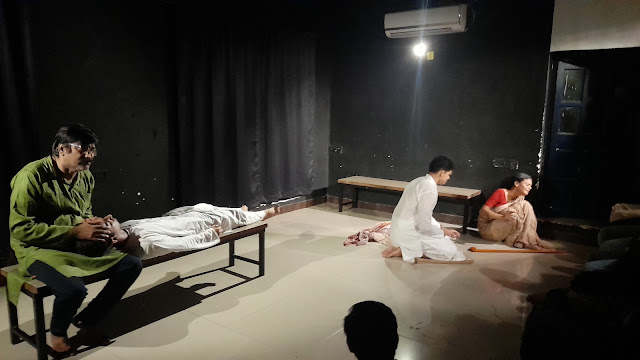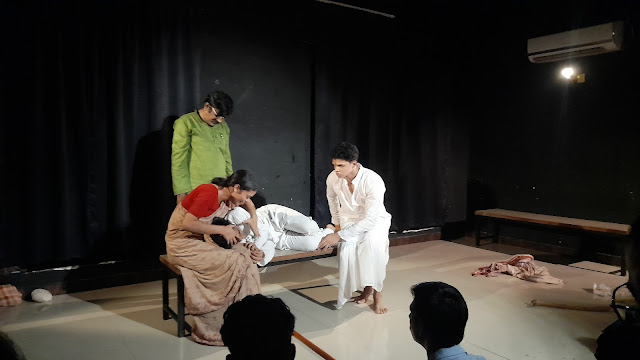To hell with male!
( हिंदी में समीक्षा के लिए - यहाँ क्लिक करके क्रम सं. 35 देखिए )
The acuteness of guilt feeling is so high that both the real male culprits testify their guilt. But Oh the Male chauvinism! You are still not able to save an innocent homemaker from gallows! Either he is a husband or a magistrate he will put all the blames on some 'she' only with total disregard to all the facts emerging in the open sky. The state of patriarchy was at peak in Bengal in the British era. But has it changed completely? Yes it has changed in favour of woman race but complete change is still a far cry only.
'Tagore-nama- a motley of small plays were performed at Asmita Theatre Studio in Versova (Mumbai) on 30.9.2023 on the auspicious occasion of 30th anniversary of Asmita Theatre Group.
A number of Ravindra Nath Tagore's pithy stories were presented in a succession in the form of small dramatic plays. Let me first give a synopsis of the brief content of the plays.
The murder of his sister-in-law has been committed by someone else but the husband requests his wife to take the blame of it so that the actual culprit (his elder brother) is saved from being hanged. He says to the villagers that another wife can be brought but not brother. Hearing this, the wife is numbed. She astonishes as whether she had left her dolls in her father's home and came to her in-laws only to see such a doomed day? But if the husband and all persons in the village are in unison on such a barbarous plan then what's the point to live more! She agrees. (Read the first para again here.) In the end, when she is about to being hanged the officer-in-charge asks her last wish. She says she wanted to meet her mother. When the officer conveys her that her husband wants to meet her. She says,"..To hell with him".
In another story, a girl is married and brought to her in-law's home. But the mother-in-law is not happy for she could not bring a big dowry. The mother-in-law mistreats her openly saying that she would have treated well if she would have brought more dowry. This news reaches the father of the bride. He decides to sell off his house and fulfil the demand. But when he goes to and conveys this idea to his married daughter, she vehemently opposes it. Also, his sons also reach there and oppose on the ground that he takes care of daughter only and not the sons. With a heavy heart he comes back to his home. After some days the newly-wed girl fell ill and wanted to go to her father's home. But the father was refused by the in-laws to take the bride to his home until the balance dowry is paid. She dies for want of treatment at her in-law's home. The same in-laws who never took care of the bride while she was alive performes the last rituals with a great pomp and show. Then immediately another bride was brought in the house whose father gave full dowry.
There was a pathetic story of a servant. He used to take the master's toddler son for a stroll. Once they were walking around, the little boy asked for some flowers visible from the bushes at a river bank. When he went to bring the flower the toddler went into the river out of curiosity and was drowned. The servant was punished for this and was thrown out of his master's home. When he returned to his village, after some time his wife became pregnant. While giving birth to a male child, she died. This boy was reared by his father (Servant) with a great love and care. But when he grew up he developed the traits of a rich person. The servant thought out a plan for repentance. He took his son to his master and told him a lie that this very boy is his (master's) actual son. His issueless master believes on it and takes custody of the child but orders the servant to go away because he concealed the truth from him. The servant pleads to let him stay there. On this the child (Servant's son) suggests his new-found rich father to commit for some pension to the man. The servant went back. When the money-order of pension was sent, it was returned because there was no recipient living there.
The story of a blind old beggar lady was equally moving. She has an adopted son whom she takes care of very eagerly. She had made some wealth out of begging and gives it to the safe custody of a money-lender so that it could be utilised in future for her son. Once her son falls sick. The old lady beggar goes to the moneylender and asks for her money. The money-lender says there is no money of her with him. With great despondency, she comes back. After some days, the condition of her son worsens. She takes her son to the moneylender and beseeches to him for money so that she could consult the doctor and her son's life is saved. But the moneylender denies it cruelly and says to her to go away with her sick son. But the moment the moneylender casts a look on the boy's face he identifies him as his lost real child. After this he requests the old lady to give custody of the boy. The old lady hands over the boy to him saying that now you would take care of him because he is your son, but till it was mine you were wishing him to die. The woman returns alone. But the boy does not recovers and his condition worsens further. The doctor says that the boy is missing his mother and if she comes then he may recover. The moneylender goes to the old lady and begs him to accompany him so that the child is saved. She revenges on him saying she would not care if his son dies. But ultimately she agrees to look after the boy who was earlier her own. The boy recovers under the care of his motherly old lady. After the child is cured the old woman is about to return. Then, the moneylender offers her the money bag she had given to him. But the old woman refuses to accept it saying it was kept only for the purpose of her son who is now with you.
A story depicted the farce of feelings in art at the cost of humanity. There is a painter who is mocked at by his colleague for lack of professionalism in his work. Their comments pinched him badly. Once his son fell ill. His condition became serious. Even though the restless wife kept crying and requesting him to call a doctor, the painter remained busy in completing his artwork for the forthcoming exhibition. The doctor could not be called and the son died. On this, his wife retired on the bed life a lifeless person taking the head of his beloved son in her arms. A great passion flashed into the painter's heart and he started a new painting of a mother taken the dead son in her lap. The painting was so realistic that it was the most acclaimed painting in the exhibition and even the taunting colleagues exclaimed their feelings that they would have loved to make him his teacher.
These were some of the stories presented. The artists were the students of this acting school namely Pradeep K Sharma, Prachi A Mishra, Soni Sharma, Manas Keswani, Siddhant Mishra, Navyug Gupta and others. The play was directed by the renowne3d director Arvind Gaur and Sangeeta Gaur had given the music.
This was not only the promptness but also the expressions and sound-modulation of the large number of participating actors that made the show remarkable. The credit chiefly goes to the director.
Review by- Hemant Das 'Him'
Send feedback to- hemantdas2001@gmail.com / editorbejodindia@gmail.com
Link of other drama- reviews: Click here
























No comments:
Post a Comment
Now, anyone can comment here having google account. // Please enter your profile name on blogger.com so that your name can be shown automatically with your comment. Otherwise you should write email ID also with your comment for identification.